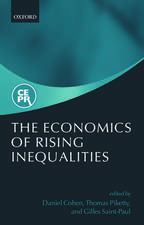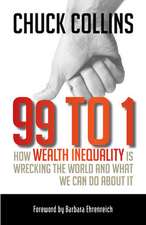Rigging the Game: How Inequality Is Reproduced in Everyday Life
Autor Michael Schwalbeen Limba Engleză Paperback – 7 mai 2008
| Toate formatele și edițiile | Preț | Express |
|---|---|---|
| Paperback (2) | 229.98 lei 6-8 săpt. | |
| Oxford University Press – | 420.96 lei 3-5 săpt. | |
| Oxford University Press – 7 mai 2008 | 229.98 lei 6-8 săpt. |
Preț: 229.98 lei
Nou
Puncte Express: 345
Preț estimativ în valută:
44.01€ • 45.95$ • 36.42£
44.01€ • 45.95$ • 36.42£
Carte tipărită la comandă
Livrare economică 05-19 aprilie
Preluare comenzi: 021 569.72.76
Specificații
ISBN-13: 9780195333008
ISBN-10: 0195333004
Pagini: 368
Dimensiuni: 206 x 137 x 18 mm
Greutate: 0.38 kg
Editura: Oxford University Press
Colecția OUP USA
Locul publicării:New York, United States
ISBN-10: 0195333004
Pagini: 368
Dimensiuni: 206 x 137 x 18 mm
Greutate: 0.38 kg
Editura: Oxford University Press
Colecția OUP USA
Locul publicării:New York, United States
Recenzii
Having taught sociology for 25 years, I have found few books as exciting and inspiring as Michael Schwalbe's pedagogic tour de force, Rigging the Game. The astonishing chapter 7 fictional "Interview with Rania O," especially, may well be the single at once most brilliantly conceived and artfully accessible expression of sociological imagination I have ever read.
Schwalbe's writing is crisp and clear. Throughout the text he provides concrete examples to illustrate concepts and theories. His analysis of how social inequality is perpetuated will make social stratification understandable and help students visualize how oppression is part of everyday life.
This text anticipates many of the questions that students raise (or silently wonder about) in a first course on inequality, and it answers these questions convincingly. This is a real teaching text.
I especially love the last chapter, with Schwalbe's hopeful conclusions and community-oriented approach. This is precisely what students need to learn to co-create the alternative institutions necessary to propel us forward into the emerging global multicultural millennium. I found this to be an engaging and insightful read, so much so that I will be pleased to incorporate it into my classes.
I really like this book and I bet that students will love it. It's not overly theoretical, and it relies on real-world examples. That's a unique and desirable combination of features.
Schwalbe's writing is crisp and clear. Throughout the text he provides concrete examples to illustrate concepts and theories. His analysis of how social inequality is perpetuated will make social stratification understandable and help students visualize how oppression is part of everyday life.
This text anticipates many of the questions that students raise (or silently wonder about) in a first course on inequality, and it answers these questions convincingly. This is a real teaching text.
I especially love the last chapter, with Schwalbe's hopeful conclusions and community-oriented approach. This is precisely what students need to learn to co-create the alternative institutions necessary to propel us forward into the emerging global multicultural millennium. I found this to be an engaging and insightful read, so much so that I will be pleased to incorporate it into my classes.
I really like this book and I bet that students will love it. It's not overly theoretical, and it relies on real-world examples. That's a unique and desirable combination of features.
Notă biografică
Michael Schwalbe is a professor of sociology at North Carolina State University. He is author of Unlocking the Iron Cage: The Men's Movement, Gender Politics, and American Culture (1996), Remembering Reet and Shine: Two Black Men, One Struggle (2004), and The Sociologically Examined Life, Fourth Edition (2008).















